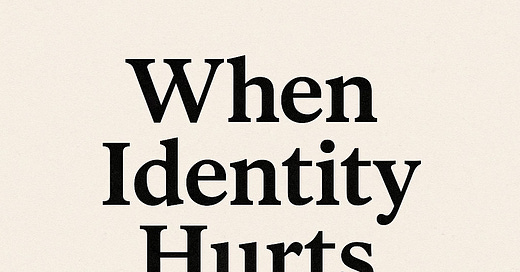When Identity Hurts: Why Leaving the Right Can Feel Impossible
From the Christian Nationalism vs Christian Patriotism Series
Listen to the podcast
Return to the Christian Nationalism vs Christian Patriotism Series
I want to tell you a story that might sound familiar—even if you've never lived it yourself.
For most of my life, I identified with a certain set of beliefs. I grew up surrounded by them. They shaped my politics, my faith, my understanding of right and wrong. They shaped who I called family, who I trusted, who I feared.
But over time, I began to feel a quiet conflict rising inside me.
I noticed things that didn’t add up—moments when the actions of “my group” violated the values we claimed to hold dear. I saw hypocrisy. I felt unease. And eventually, I could no longer deny the growing gap between my identity and my integrity.
Letting go of that identity was not a light decision. It was not a political rebranding or a lifestyle pivot. It was grief. It was loss. I felt hesitation, sadness, confusion, even anger. I knew that telling the truth—my truth—meant risking ostracization. It meant potentially losing connection to people I loved.
And yet, I couldn’t un-know what I now knew.
What If They're Not Ready?
That’s what I want to explore in this piece.
We often ask: Why don’t more people on the right walk away—especially when faced with cruelty, lies, or contradictions they once would’ve rejected?
What if the answer is this: They’re not emotionally equipped to face the kind of loss that leaving would require.
The Psychology Behind the Pain
1. For Conservatives, Identity Is Everything
Studies show that conservative and especially Christian nationalist identities are deeply entwined with faith, patriotism, family, and belonging. One PRRI study found that over 60% of Christian nationalists believe that “to be truly American, one must be Christian.”
This isn’t just a belief system. It’s a totalizing identity.
Leaving that behind doesn’t feel like changing your mind—it feels like erasing your entire sense of self.
2. Values Flow From Identity—Not the Other Way Around
Psychologist Jonathan Haidt’s research shows that conservatives build their moral framework on loyalty, authority, and sanctity—while liberals prioritize care and fairness.
That means for many on the right, questioning the group = betraying morality itself. Truth doesn’t override identity; identity defines what counts as truth.
3. Emotionally Threatening = Physically Painful
Neuroscience confirms it: social rejection triggers the same brain regions as physical pain (Eisenberger & Lieberman, 2004). Leaving a faith community or political tribe isn’t just hard—it can feel like bodily harm.
So when a person’s identity is threatened, they may:
Fight (lash out, double down, escalate)
Flee (avoid, deny, disengage)
Freeze (disassociate, go silent, “wait it out”)
And that brings us to the heart of this issue.
What They’re Facing Isn’t Just Political. It’s Existential.
Imagine realizing that:
The people you trusted lied.
The values you were taught to uphold are being violated.
The group you belong to might no longer recognize you if you speak up.
Now imagine you’re someone who has been taught to fear complexity, to suppress emotional expression, and to anchor your entire worth in belonging.
Do you fight? Do you flee?
Or do you do the harder thing:
Sit with the grief.
Feel the loss.
Rebuild your identity.
That’s what I had to do. It hurt. It still hurts some days. But I also found something I didn’t know I was missing—emotional integrity.
Research Confirms What I Lived
Conservatives tend to show stronger reactivity to threat (Liberman et al., 2007) and a higher sensitivity to disgust and moral violations, which reinforces black-and-white thinking.
Emotionally, they show greater self-control but less tolerance for ambiguity and emotional complexity (Jost et al., 2003; Amodio et al., 2007).
When identity is challenged, their fight-or-flight systems activate intensely, with heightened brain responses to perceived betrayal or contradiction.
So the reason many don’t “wake up” or “walk away” isn’t stupidity or cruelty—it’s a neurological and emotional wallthey don’t know how to climb.
What I Hope This Sparks
This isn’t a takedown of conservatives or Christian nationalists.
It’s an honest look at the emotional reality of identity loss. And it’s a hand extended to anyone who’s wrestling with that inner split between what you believe and what you see.
You’re not weak for hesitating.
You’re not evil for staying silent.
But you do have a choice.
You can keep denying the tension and numbing the pain. Or you can be brave enough to feel it—and honest enough to change.
A Question for You
Have you ever had to leave behind an identity to stay true to your values?
What helped you get through the grief—and what held you back?




